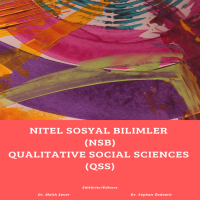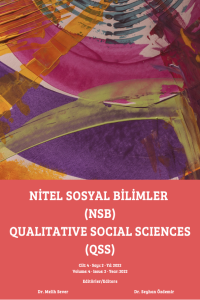Research Article
Aim & Scope
Qualitative Social Sciences (QSS) is a peer-reviewed, open access, international journal published two times a year (June & December). The main aim of this journal is to develop qualitative interpretation and analysis of phenomena in social sciences, including, but not limited to: psychology, organizational behavior, social work, sociology, social anthropology, counseling, marketing, narrative studies, and nursing.
The journal publishes only: research papers based on qualitative methods or mixed methods, review and theoretical papers, and research notes (short papers focusing on methods and how research is conducted). Manuscripts can be written in either English or Turkish.
Author Guidelines
Author Guidelines
For article template click here.
This journal uses a double-blind review, which means that the identity of the author(s) is concealed from the reviewers, and vice versa, throughout the review process. To facilitate this, authors need to ensure that their manuscripts are prepared in a way that does not give away their identity. The journal accepts submitted studies according to the evaluation report of at least two reviewers.
Articles to be submitted to the journal:
The study should not exceed 9000 words, including an extended summary and references.
In Turkish texts, 750-1000 words of English extended summary should be given in addition to the abstract of 300 words and up to six keywords in Turkish. In English texts, only max. 300 words abstract in English and up to six keywords and Turkish abstract should be included. QSS will assist with the translation of the summary for English texts when necessary.
The use of language that includes sexism, racism, prejudice, or discrimination should be avoided.
The manuscripts should be written in accordance with the writing and style principles of the Publication Manual of the American Psychological Association, 7th edition https://apastyle.apa.org/products/publication-manual-7th-edition (APA 7, 2020). You can find references in APA 7th style in this link.
Language Use
The manuscript submitted should not be published elsewhere, whether in print or electronically, partially or completely, nor should it be under consideration for publication elsewhere. Manuscripts that are reviewed and accepted for publication by the editorial board of the journal may be sent back to their authors for revision, if necessary, in accordance with the criticism and suggestions received from peer reviewers. Submitted articles are to be published only upon the approval of the Editorial Board. The effective use of Turkish or English language according to academic standards is an important criterion for evaluation.
Contribution Statement
Contribution details (eg, equal contribution) must be included in the contributors section at the end of the article.
Declaration of Competing interest
All authors must disclose all financial and personal relationships with other individuals or organizations that may affect the integrity and objectivity of their work. Examples of these relationships are employment, consulting, compensation, paid testimony, patent applications, grants or other support.
Acknowledgements
In this section, acknowledgements should be provided regarding the organizations supporting the study and any individuals who contributed but were not authors.
Reference Style
References should be written in accordance with the guidelines of the APA Publications Manual of the American Psychological Association, 7th edition published by the American Psychological Association (APA 7, 2020).
Ethical Principles and Publication Policy
Price Policy
There is no fee for submission, article-editorial processing, or publication (page or color charges) of manuscripts.
Indexes
Journal Boards
Editor in Chief

Editor

Seyhan ÖZDEMİR, Tarsus’ta doğdu. 2012 yılında Süleyman Demirel Üniversitesi İktisadi ve İdari Bilimler Fakültesi İşletme Bölümünden, 2014 yılında ise Sosyal Bilimler Enstitüsü İşletme Bölümü Yönetim ve Organizasyon anabilim dalından mezun oldu. Yine aynı üniversitede 2018 yılında doktora eğitimini tamamladı. Halen Süleyman Demirel Üniversitesinde İnsan Kaynaklari Yönetimi Bölümünde öğretim üyesi olarak çalışmaktadır.
İlgi alanları; örgütsel davranış, iş yeri duyguları(kıskançlık, intihar, damgalama), kirli işler ve örgütlerde sosyal medya çalıştığı konular arasındadır.
Editorial Board

 Web
Web
Born in 1978 in Nizip, Gaziantep, Şener completed her undergraduate studies in Health Education at Ankara University and in Sociology at Atatürk University. She holds two master’s degrees: one in Health Management from the Institute of Health Sciences at Ankara University, and another in Curriculum and Instruction from the Institute of Educational Sciences at the same university. She earned her Ph.D. in Management and Organization from Süleyman Demirel University. She is currently a student in the Department of Philosophy at Anadolu University, where her academic interests focus on the intersection of management with sociology, history, and philosophy. Between 2002 and 2005, she served as an instructor at the Ankara Gevher Nesibe Health Education Institute, and from 2005 to 2015 at Muğla Sıtkı Koçman University, Faculty of Health Sciences. Since 2015, she has been a faculty member in the Department of Business Administration at Kırşehir Ahi Evran University, specializing in Management and Organization. In 2021, Şener received the title of Associate Professor in “Management and Strategy.” She is the author of the books Organizational Revenge, Virtue from Organizational Theory to Organizational Behavior, and A Trilogy in Pursuit of Civic Virtue: Compliance, Morality, Voice. She has also served as editor of the volumes Knowledge Management in the Digital Age: Concepts, Theories and Applications, Industry 4.0 Paradigm: The Digital Transformation of Business Functions, and Women and Family.




Language Editors
Advisory Board

Dr. Narina A. Samah is an associate professor at the Faculty of Educational Sciences and Technology, Universiti Teknologi Malaysia (UTM) Johor Bahru. She obtained her Bachelor of Human Sciences in Psychology (Hons) from the International Islamic University Malaysia (IIUM) in 1997, and her Master of Human Sciences in Psychology from the same university in 2001. Dr. Narina received her Doctor of Philosophy (PhD) from the University of Bristol, United Kingdom in 2011 and was later awarded a Graduate Certificate in Tertiary Education Management from the University of Melbourne, Australia in 2015. She currently teaches cognitive psychology and research methods in education, with a focus on qualitative psychology and narrative inquiry. Her research interests encompass the cognitive aspects of learning and teaching, with a great emphasis on critical reflection, reflexivity, epistemic cognition, metacognition, complex problem solving, and brain functional connectivity during the learning process, in addition to SoTL research exclusively.

Dr. Asli Cennet Yalim is an assistant professor at the University of Central Florida School of Social Work. She draws on her interdisciplinary background and international experience to study refugees’ psychosocial wellbeing, understand the challenges refugees face upon resettlement in another country, and develop culturally responsive interventions to improve post-resettlement outcomes of refugees. Her areas of research are refugee mental health, trauma-informed services for immigrant populations, refugee women, CBT and mindfulness-based interventions, and wellbeing of healthcare workforce. Her methodological approach includes mixed-methods, grounded theory, and community-based participatory approach. Dr. Yalim has collaborated on funded projects including an interprofessional, evidence-based virtual program to prevent burnout, suicide, and mental health conditions among healthcare workers and the development of a mental health and psychosocial intervention with refugee women and survivors of earthquake in Turkey. She teaches courses on the topics of human behavior, research methods, and social work with immigrants and refugees.
indeksler










